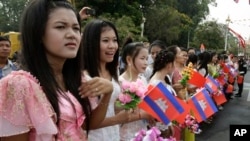Cambodia says it has asked China to restrict the number of visas it issues to single Cambodian women, to prevent the brokering of marriages to Chinese men.
The appeal comes as an increasing number of Cambodian women are finding their way into Chinese marriages and becoming victims of human trafficking.
Chu Bun Eng, Secretary of State for the Ministry of Interior and head of the National Authority Against Human Trafficking, said restrictive visas will help lower the number of trafficked women.
"We sent a letter to Chinese embassy telling them that nowadays many Cambodian women are tricked by fake marriage to Chinese men in China," she said. "They are now suffering. We request the embassy refer the issue to Chinese authorities in China."
Koy Kuong, a spokesman for the Ministry of Foreign Affairs, said Cambodia has asked for China’s cooperation, including at its embassies in Laos, Vietnam, and Thailand, where Cambodian women might also request visas.
"Because this issues keep piling up, the Ministry of Foreign Affairs requested cooperation from the Chinese embassy to deal with the issue," he said. "That is why Chinese embassy has started to have tougher restrictions on visas for single Cambodian women traveling to China."
But a Chinese spokesman said he could not confirm or deny that Beijing was prepared to restrict visas.
Chinese Embassy spokesman Cheng Hong Bo did say that China is ready to work closely with Cambodia on the issue of human trafficking. "Between the two countries, I think that we should put more emphasis on [the trafficking issue] too," he said.
Human trafficking has been a longstanding problem in Cambodia.
The rights group Adhoc says that in the first six months of this year, it has received 108 complaints of cross-border trafficking, with some 295 victims involved. Of those, 29 people had reportedly gone to China.
Lim Mony, Adhoc’s deputy chief, said trafficked women who have managed to escape China report sexual abuse, overwork and starvation.
“They said that some of the victims took suicide drugs and others went into hiding or are detained to work as slaves in the homes,” she said.
She added that traffickers running the sham marriages have a deep network in Cambodia and China.
One victim of the scheme who decided to withhold her name, agreed to be interviewed at her impoverished home in Kampong Cham province. She said her family was persuaded by a middleman to send her to be married to a man in China, and in exchange her family would receive money each month.
Instead, she said, she was taken by a human trafficker who raped her before passing her on to a Chinese man who let her live with him in rural China.
"I thought I would get a good husband — one husband only ... I was first raped by the trafficker. I was forced to change from one husband to another. Finally I get a poor husband living near a mountain," she said, adding that her life there was "miserable, like a living hell."
She managed to escape the house and call her mother, who sought out Adhoc for help. After eventually returning home she filed a complaint against the trafficker, who remains at large.
Chu Bun Eng says her ministry will take action regarding any complaints that reach her office.
"If they filed complaint against a trafficker and we didn't take actions, then they can say we ignore them. But we never ignore any report of human trafficking. The important issue is that the victims need to cooperate with the authorities to successfully do the jobs," she said.
But Adhoc says many victims have filed complaints and government officials have refused to take action.




